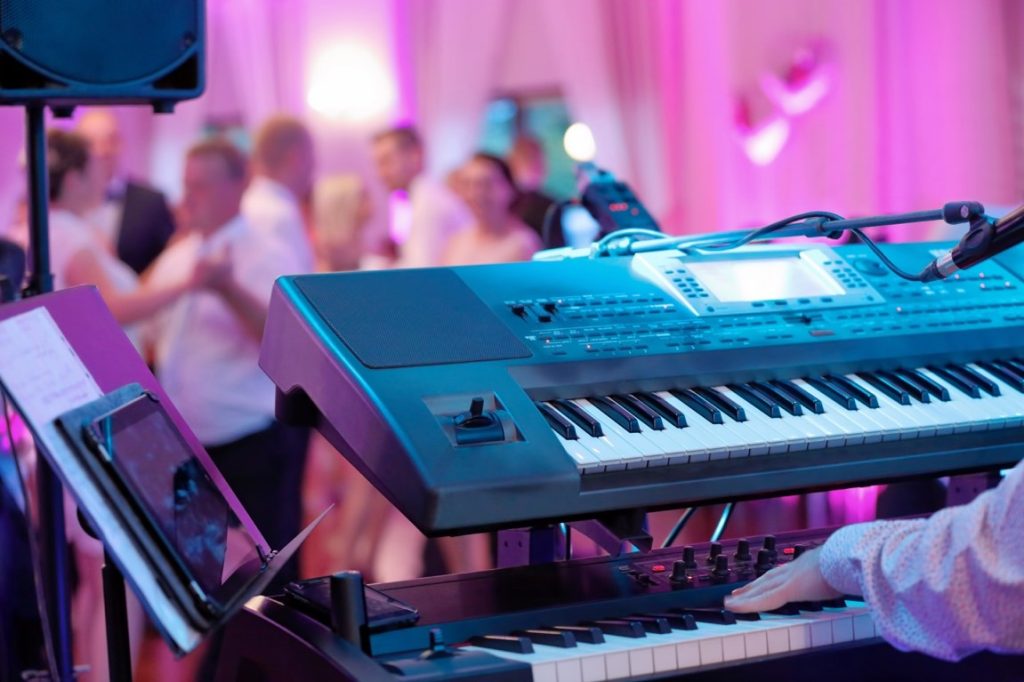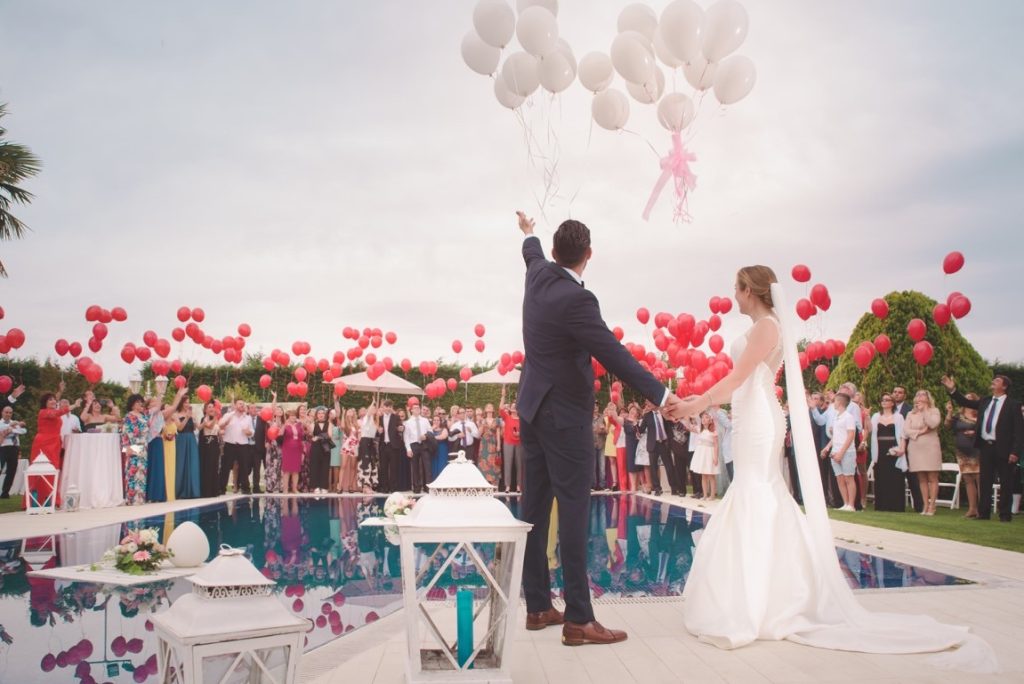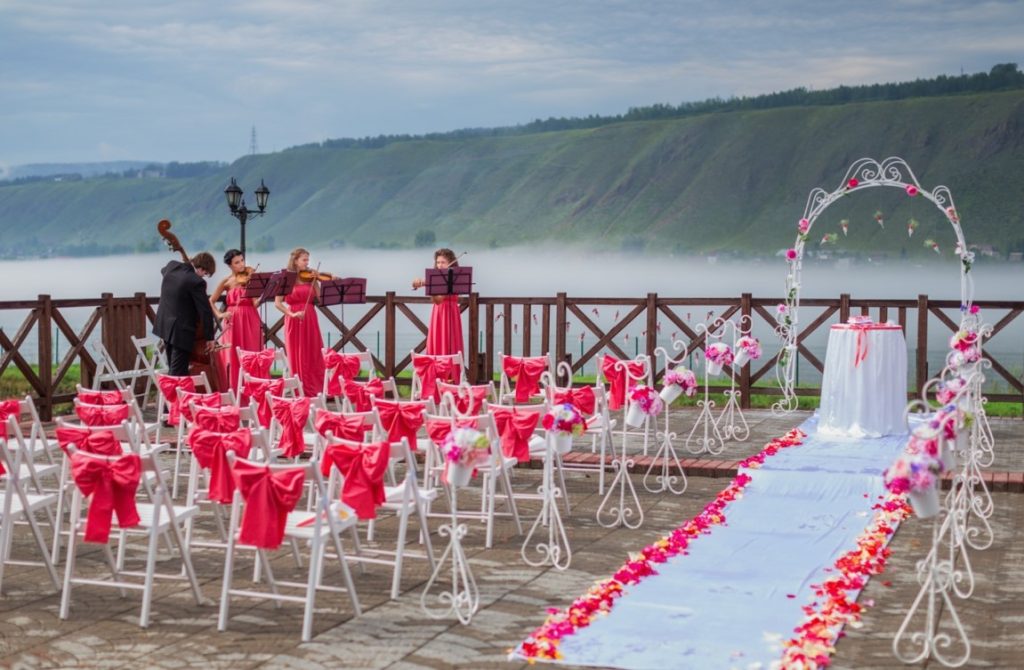Music is an essential part of our lives. We all have a favorite song — or a playlist — we listen to because it brings us joy, motivates us for the day, or makes us remember specific memories. This explains why couples often stress out about the songs they will play during their wedding.
While creating a wedding song checklist, you might be unsure of how many songs for the wedding ceremony you should put. In general, expect to pick 3 to 15 songs. However, be mindful of these four deciding factors:
- Type of ceremony
- Wedding itinerary
- The vibe of your wedding
- The venue
Each factor that affects how many songs you should prepare for your wedding ceremony is explained in further detail below, along with some helpful tips to make the process less challenging.
How Many Songs for Wedding Ceremony: Things to Consider

1. Type of Ceremony
There are at least 19 types of wedding ceremonies, each with different parts and timelines. These differences ultimately necessitate varying numbers of songs. Here are some ceremonies and what you should expect regarding the music.
Church Wedding
There are two general types of Church weddings: with Mass and without Mass. The former usually lasts 20 to 30 minutes, while the latter takes 45 to 60. These two classifications have subtle differences, such as the presence of a Communion Rite.
However, for both types of Church weddings, you should expect the following:
- One to three songs for the processional
- Two to three hymns the congregation will sing
- Two to three songs to play while the couple signs the register
- One song for the recessional
Civil Ceremony
Civil ceremonies are any type of marriage not affiliated with a religion. Couples have a lot of freedom with how they want their civil wedding to happen. However, in general, every civil ceremony will have these songs:
- One to two songs for the processional
- Around three songs while the couple signs the register
- One song for the recessional
There is no specific figure for the signing of the register, as the duration of this part widely varies per couple. In some cases, the register signing is quick and straightforward. In other cases, the newlyweds have a photo op with the guests before proceeding with the rest of the ceremony.
Other Types of Ceremony
As mentioned above, there are many types of wedding ceremonies. A couple can choose which one best fits their relationship and their personalities and beliefs. Although there is a lot of variation from one type of ceremony to another, here are some general things to keep in mind:
- One to three songs for the processional
- One to two songs for the unity ceremony (if any)
- One to two songs for the recessional
2. Wedding Itinerary

As illustrated above, the parts of your wedding will influence the number of songs you must include in your celebration. For example, make sure to prepare one to two songs if you will perform a sand ceremony. This music will play in the background as the officiant explains the symbolism while you perform the tradition.
Moreover, the duration of each part of your wedding also matters. For instance, the processional can last anywhere within five minutes. How long will the bridal party have to reach the altar? How much time will the bride herself have to walk down the aisle?
You can have one song playing in the background as every bridal party member, including the bride, walk down the aisle. However, many couples prefer having a different song to mark the bride’s arrival. Some also choose music for the couple’s parents’ entrance.
It is worth noting that more couples are choosing to add unique traditions to their ceremony, one of which is a guest singalong. If you want to incorporate this idea into your itinerary, choose a famous song that is short, lively, and easy to sing along to.
3. The Vibe of Your Wedding

For the most part, the most significant parts of a wedding that need music are the processional and recessional. These moments are when the bridal party enters and leaves the venue, respectively.
Choosing songs for the two abovementioned parts will suffice if you want a straightforward wedding.
However, if you want a specific vibe or ambiance for your special day, the best — and most subtle — way to achieve it is through music. In particular, you should consider looking into three categories of ceremony music:
- Prelude music. Songs you chose as preludes will play in the background as your guests enter the venue. From the moment they look for their seats, they will get an idea of the day’s tone from this music alone. It might be best to prepare at least five songs for the prelude.
- Interlude music. This category encompasses any song played during the wedding, which includes religious hymns, sentimental songs, classical music that plays in the background during traditions or unity ceremonies, and more.
- Postlude music. Oppositely, guests will hear postlude music in the background as they leave the venue. Many couples choose songs with a celebratory mood, given that everyone will head straight to the reception. Around four to five songs will suffice.
4. The Venue

Your wedding venue might have specific guidelines regarding ceremony music. For instance, your church might have you choose a certain number of songs from their curated selection.
Furthermore, the venue might have an in-house band, organist, or choir. While they might not explicitly limit how many songs you can have in your ceremony, your options might be more limited.
You must also consider the available space and equipment at the venue. For example, you might only have enough room for one musician. The acoustics might not be the best, too. Not only will these factors limit the songs you can play, but they will also affect the sound quality.
Similarly, take note of the wedding venue’s popularity. Are there weddings scheduled directly before or after yours? This phenomenon usually happens at Church weddings, but you might encounter this issue at any venue.
In the case of a packed schedule, your time in the venue is limited. You might have no chance to play any prelude or postlude music.
Important Tips for Wedding Ceremony Songs

Pick Appropriate Music
“Appropriate” is a vague, general term. As such, it can be challenging to gauge whether a song would be appropriate for your wedding ceremony or not. However, here is some advice that can hopefully make the process of choosing songs easier.
- Read the lyrics thoroughly. Avoid songs with explicit themes, inappropriate words, and generally distasteful content. Civil ceremonies might also discourage songs about or related to your religion.
- The best music for wedding ceremonies is classical music, as they reflect the solemnity and wonder of the event. Slow songs, even if not classical, are also beautiful choices.
- The exception to the above rule is recessional music. Although you can choose a classical piece, it is more popular to go with an upbeat song to set the tone for the reception.
- Choose songs that have personal significance. Since it is your wedding, make sure you have a sentimental connection to the music. Doing so will make the day feel more unforgettable and magical.
Pay Close Attention to Venue and Ceremony Guidelines

Choosing songs that are significant to you and your partner is one thing but making sure they are approved is another. Getting approval might not be an issue for destination weddings, elopements, humanist ceremonies, and various other types of celebrations.
However, you need to ask for permission to play certain songs at a church or city office wedding. You must submit your music choices to the pertinent religious leader, registrar, or authority, and they will determine the appropriateness of the pieces.
Work Closely with Your Wedding Planner
There are many aspects to take care of when planning a wedding. Although music seems like a minor detail compared to others, there is a lot to consider in this regard: how many songs for the wedding ceremony and the reception, whether to hire live musicians or DJs, and more.
Furthermore, your venue might have rules and limitations you can accidentally forget because of stress.
Cultivate a close working relationship with your wedding planner. Ask them for help with your song checklist and getting the music approved by the relevant authorities. Your planner can handle the nitty-gritty details, as they are experienced and equipped to do so.
Create a Detailed Wedding Song Checklist
The concept of a wedding song checklist was mentioned above. This list includes music for both the ceremony and the reception. There are several benefits to creating such a checklist, including:
- You can visualize your progress while you choose music. Without a list, it is easy to forget a specific part of the ceremony.
- This checklist will assist your live musician, DJ, or the person in charge of the music at your ceremony. They will know what songs to play and avoid, and the list will allow them to improvise if necessary.
Consider Hiring Musicians

Speaking of music-related vendors, you and your partner should determine whether or not you will hire one for your wedding.
However, do not feel as if you must hire musicians. If you have a limited budget or would rather spend the talent fee on something else, you are free to do so. Likewise, your venue might not even allow musicians.
With that said, there are plenty of ceremony musicians who can elevate the vibe of your wedding. They can set the tone for the day, getting your guests more engaged and comfortable during the ceremony.